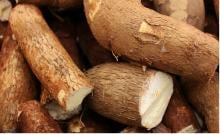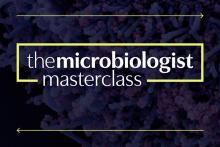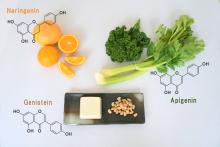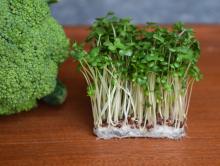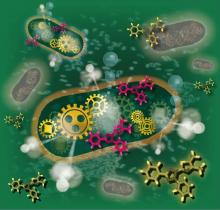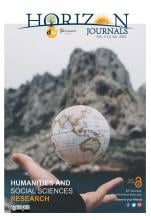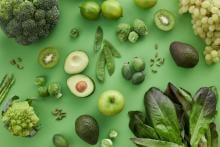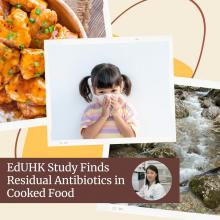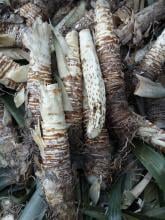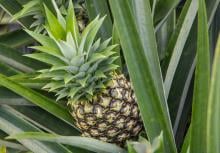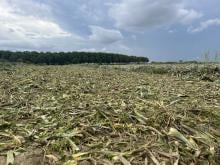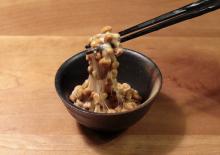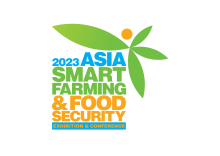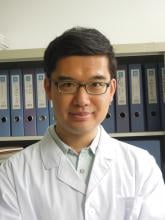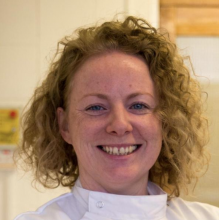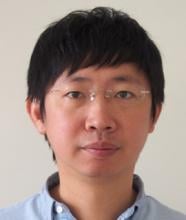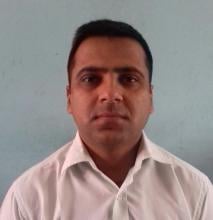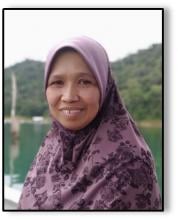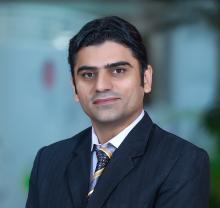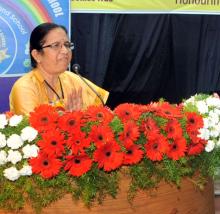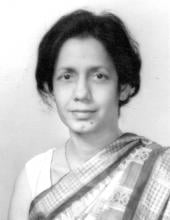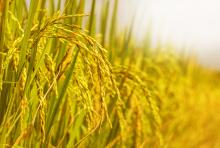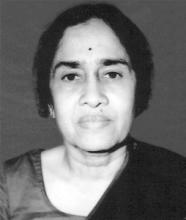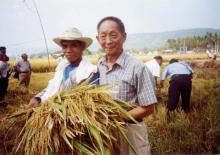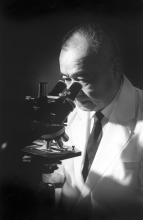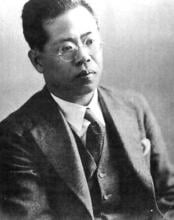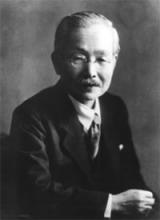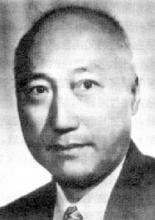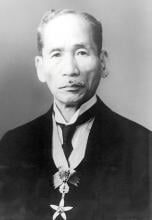Food
News
11 Apr 2024
Researchers have identified 14 genes that thale cress express more when responding to five specific stressors, as well as eight genes that the plant suppresses.
03 Apr 2024
Disease-causing E. coli among species labeled electrochemically using organic metallic nanohybrids
29 Mar 2024
The lipids in some herbal teas have been identified in detail for the first time, preparing the ground for investigating their contribution to the health benefits of the teas.
19 Mar 2024
The 12th Starch Value Chain ASIA conference was held in Vientiane, at Crowne Plaza Hotel, from February 27 to 29, 2024. The conference encompassed four key themes: Asia’s starch markets, industrial and food-grade tapioca starch in Laos with expansion plans, sustainable climate-smart agri-technology for rice and cassava cultivation, and challenges for future growth in Asia's biogas-to-energy sector.
07 Mar 2024
In celebration of International Women's Day, we are putting the spotlight on women experts from various fields who are open to speaking with international media about their research and advocacies.
27 Feb 2024
Applied Microbiology International has announced it will be launching a new series of educational online content called The Microbiologist Masterclass.
16 Feb 2024
Asia Research News monitors the latest research news in Asia. Some highlights that caught our attention this week are combining rice with animal cells, how microbes make tastier tea, and choosing flavorings and substitutes for salt to reduce the risk of hypertension.
19 Jan 2024
Asia Research News monitors the latest research news in Asia. Some highlights that caught our attention this week are watching plants warn each other of danger, how even “harmless” addictions can have a serious side effects, and how to clear roads and railways faster using gold nanorods.
08 Dec 2023
Asia Research News monitors the latest research news in Asia. Some highlights that caught our attention this week are how eels can transfer DNA, older babies falling for tricks that younger ones do not, and a crystal layer deep in the Earth.
30 Nov 2023
An international team of researchers led by Osaka Metropolitan University has elucidated the process by which the major flavonoids naringenin, apigenin, and genistein are metabolized in the body. These findings are fundamental in elucidating the correlation between the metabolism of flavonoids in the body and their potential health benefits.
29 Nov 2023
Mycorrhiza biofertilizer Uttam Superrhiza has been named as the winner of the Applied Microbiology International Product of the Year 2023.
The prestigious prize recognizes a commercial product derived from microbiology research, with special consideration given to those products that have addressed the United Nations Sustainable Development Goals.
16 Nov 2023
The winners of the Applied Microbiology International Horizon Awards were announced at the prestigious Environmental Microbiology lecture 2023, held at BMA House in London on November 16.
09 Nov 2023
New shrimp species in ancient hot spring, Super sprouts, How "warm-ups" work, New antiviral candidate, Solving voltage decay and from our blog: A sustainable future shines in TIE 2023. Read all in the latest Editor's Choice.
20 Oct 2023
A research team from Osaka Metropolitan University has found that polysulfides are abundant in broccoli sprouts. They found that the amount of polysulfides increased dramatically during growth, by an approximately 20-fold in seeds by the fifth day of germination. Furthermore, a comprehensive analysis of the polysulfides detected a number of polysulfide candidates whose structures have not yet been determined. The identification of these unknown polysulfides and detailed analysis of their pharmacological activities are expected to enable the development of new preventive and therapeutic strategies and medicines for cancer, neurodegenerative diseases, stroke, inflammation, and other diseases.
16 Oct 2023
The shortlist for the Applied Microbiology International Awards 2023 has now been announced.
The AMI Awards programme is designed to celebrate the brightest minds in our field and promote the research, group, projects, products and individuals who continue to help shape the future of applied microbiology.
11 Sep 2023
Patients with a specific form of chronic indigestion react differently to images of food, compared to healthy control subjects or patients with irritable bowel syndrome.
11 Sep 2023
Researchers at Osaka Metropolitan University have developed a measurement technique that rapidly measures the number of viable bacteria in food products. They have succeeded in drastically reducing the inspection time from 2 days to about 1 hour. With this technology, it will be possible to confirm food safety before shipment from factories and prevent food poisoning.
01 Sep 2023
Asia Research News monitors the latest research news in Asia. Some highlights that caught our attention this week are the detection of a rare isotope of oxygen, converting waste coconut fibers into a flavoring compound, and a smart contact lens battery that can be powered by tears.
18 Aug 2023
Asia Research News monitors the latest research news in Asia. Some highlights that caught our attention this week are vegan 3D printed calamari rings, 4 000-year-old ceramic pipes and ditches, and how swirling stars make some rethink how gravity works.
14 Aug 2023
Greetings from JHSSR, Horizon is proud to announce the highly acclaimed publication of the latest issue of 2023, Vol. 5, Issue 1 (Jul. 2023).
The issue is now live at the Journal’s webpage. You may explore our range of contributions within this Issue. Explore this issue, click the links below.
11 Aug 2023
A team of scientists from Thailand and Malaysia, led by principal investigator, Associate Professor Taweechai Amornsakchai from Mahidol University, has successfully developed a low-cost and green method to make films prepared from pineapple stem starch for food packaging, such as fruits and vegetable.
03 Aug 2023
Dr. Zhang Yi, the lead scientist, and his team of researchers from Canada, Singapore, the UK, have successfully completed a study, comparing the efficiency of various bioreactors in producing Raspberry Ketone through Submerged Fermentation. This research marks the first time such a study has been conducted.
04 Jul 2023
The use of veterinary antibiotics is not uncommon in the fields of animal husbandry and fisheries to speed up growth and prevent disease. However, residual antibiotics may damage human gut microbiota, promote antibiotic resistance, and even delay the growth and development of brain cells, posing hazards to human health.
30 Jun 2023
Asia Research News monitors the latest research news in Asia. Some highlights that caught our attention this week are whether octopuses have dreams, an app that can tell you if your cat is in pain, and interchangeable arms for cyborg dancing.
18 Jun 2023
A team of researchers from universities in Thailand and Malaysia have collaborated to develop a unique kind of bioplastic sheet that is good for the environment and can decompose naturally. They made this bioplastic sheet using a byproduct of the bromelain industry which used the leftover pineapple stems from agricultural waste. This new type of bioplastic sheet has the potential to be used as single-use packaging material, as an alternative to the use of harmful plastic sheet, contributing to a more sustainable way of doing business and promoting a circular economy.
16 Jun 2023
Asia Research News monitors the latest research news in Asia. Some highlights that caught our attention this week are a potential answer to the question of which came first the chicken or the egg, vaginal seeding to boost baby microbiomes, and looking at remnants of the universe that used to be filled with gas.
07 Jun 2023
Scientists from Thailand, France and Singapore have conducted groundbreaking research using both tiny cellulose nanofibers (CNF) and long pineapple leaf fibers (PALF) to create stronger materials. They added varying amounts of CNF to epoxy and found that 1% CNF greatly increased impact strength. PALF-epoxy composites showed significant flexibility and strength improvements. Combining CNF and PALF resulted in a remarkable increase in impact strength. The findings could revolutionize stronger material development.
25 May 2023
A group of researchers from universities in Thailand and Malaysia have collaborated to develop a unique kind of film that is good for the environment and can decompose naturally. They made this film using leftover pineapple stems, which helps reduce the use of harmful plastic films. This new film has the potential to be used as packaging material, contributing to a more sustainable way of doing business and promoting a circular economy.
25 May 2023
Eating fermented foods might be the secret to a healthy and long-lived society
Events
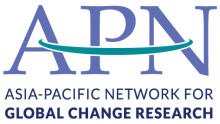
09 Nov 2023
Seeking to build experience in collaborative regional research and scientific capacity development in the Asia-Pacific region? Interested in writing grant proposals for global environmental change projects? Come and join our open capacity building seminars to receive grant proposal writing guidance and an introduction to the Asia-Pacific Network for Global Change Research (APN)'s 2023 Call for Proposals. Two seminars are available on the 9th and 10th of November, and we warmly welcome participation from early career professionals and global change practitioners in the Asia-Pacific region.
03 Oct 2023
The Journal for Humanities and Social Sciences Research is calling for papers in conjunction with the Asia Smart Farming & Food Security Conference 2023, scheduled to take place from 3rd-6th October in Kuala Lumpur, Malaysia
11 Oct 2021
Pandemics and Policy: Protecting Health and Promoting Economic Recovery
28 Sep 2021
TECHINNOVATION is a premier technology-to-industry matching event presented by IPI. It brings together international technology providers and enterprises to accelerate the commercialisation of emerging technologies, seed licensing opportunities and foster open innovation collaborations.
25 Oct 2021
First in the region focused on recognizing innovations, initiatives, programmes and ideas which contribute to sustainability, eradicating poverty, improving well-being, protecting our planet, and building peace and prosperity.

26 Mar 2021
Springer Nature and the University of Tokyo to hold SDGs Symposium 2021, “Interdisciplinary science solutions for food, water, climate and ecosystems Sustainable Development Goals”
18 Nov 2020
The Asia-Pacific Agri-Food Innovation Summit will focus on accelerating innovation in supply chain resilience, urban food systems, alternative proteins, and affordable nutrition. Will you be joining the conversation virtually on November 18-20?
The Khwarizmi International Award (KIA) acknowledges the efforts made by researchers, innovators and inventors from across the globe and to appreciate their high quality research work and contributions to different fields of science and technology.
25 Sep 2019
Vitafoods Asia is the dedicated event for Asia's nutraceutical, functional food and beverages, and dietary supplement industries, providing 350+ global suppliers to meet and do business with 6000+ visitors across the industry's four key areas from ingredient to shelf.
20 Nov 2019
Accelerating technology and investment in Asia’s agri-food supply chain
Researchers
Ts. Uganeeswary Suparmaniam, AMIChemE (UK) is a multiple award-winning young scientist, sustainability advocate, and climate activist attached to the HICoE-Centre for Biofuel and Biochemical Research, Institute of Self-Sustainable Building, PETRONAS University of Technology, Malaysia.
Dr. Chong Li Choo is an accomplished academic, Associate Professor at Taylor's University, expert in food technology, and innovative product design. Award-winning researcher, director for Food Security & Nutrition Impact Lab, and impactful leader in the field.
The Chinese University of Hong Kong (CUHK)
Epidemiologist working with health of marginalized groups, including migrants, informal houses residents, homeless and women caregivers.
Dr. Zheng Chen is an environmental chemist and associate professor at Xi'an Jiaotong-Liverpool University. His research interests include nutrient recycling from agricultural waste, soil contamination and remediation.
Nanyang Technological University
Dr. Edison H. Ang has a background in materials science and engineering along with a diverse skill set. He completed his undergraduate studies, earning B.S. degrees, at Nanyang Technological University in Singapore in 2012. Later, in 2017, Dr. Ang received his Ph.D. from the same university. He gained additional experience as a Postdoctoral Fellow at the National University of Singapore from 2016 to 2017 and later served as a Research Fellow at Nanyang Technological University from 2017 to 2019. In mid-2018, he also took on a Visiting Scholar role at the Technical University of Munich in Germany.
Currently, Dr. Edison H. Ang serves as an Assistant Professor at the National Institute of Education/Nanyang Technological University.
His expertise encompasses various areas, including 2D Nanomaterials and Nanotechnology, Energy Storage and Conversion, Sensor Technology, Membrane Technology, Additive Manufacturing, Catalysis, Waste-to-Wealth, Surface Coating and Film, Circular Economy, Renewable Energy, Sustainability, and Chemistry and Chemical Engineering.
Dr. Crumlish has researched aquatic microbial diseases, specifically ones that have economic impact in global aquaculture, and potential solutions to such infectious diseases. Her current project seeks to develop vaccines against antimicrobial resistance in aquaculture.
Dr Kanimolli Arasu is a lecturer and a dietitian at the International Medical University, Malaysia.
International Islamic University Malaysia (IIUM)
Dr. Nor Aiman Sukindar has joined International Islamic University Malaysia in 2019 and currently working as Assistant Professor in Manufacturing and Materials Department and at the same time holding a position as Chairman of the Advanced Manufacturing and Material Research Unit (AMTech). Before joining IIUM, Dr. Aiman was working with Politeknik Kuching Sarawak for more than seven years from 2011 until 2019.
Dr. Aiman has extensive experience in research pertaining to additive manufacturing technologies including the design and development of 3D printers, fabricating scaffold structures for bone replacement using biomaterials, optimization printing parameters, and any other related field. Dr. Aiman was awarded grants from industries and the government including PPRN, Tin Grant, and Sponsored research grant.
Recently, Dr. Aiman won several awards including a silver medal in Asia Innovation Festival 2022, Gold Medal in RITEC 2021 Competition in 2021, and a silver medal and Outstanding Award in SDG MTE 2021 Competition also in 2021.
Hong Kong Baptist University (HKBU)
Prof. Cai Zongwei is now the Chair Professor of Chemistry in the Department of Chemistry and Director of both State Key Laboratory of Environmental and Biological Analysis as well as Dioxin Laboratory, Hong Kong Baptist University.
The Education University of Hong Kong (EdUHK)
Dr. Brian Man Yu Bon is currently serving as an Assistant Professor in Department of Science and Environmental Studies, The Education University of Hong Kong.
Ms. Nagal is an alumna of the University, who graduated with a Bachelor’s degree in Hotel and Restaurant Management from the College of Tourism and Hospitality Management and a Master in Business Administration major in Entrepreneurship from the UST Graduate School.
An energetic and talented researcher with a strong desire to build a career within the research industry. Passionate, self-motivated individual with a drive to succeed, with excellent organizational skills. Highly efficient and methodical with a good eye for detail with a proactive approach to performance and data accuracy.
I am a Health Economist/Researcher, working with UN agencies in the development of policy documents for developing countries including Nepal, Ethiopia and Pakistan.
Singapore University of Technology and Design
Mr. Lee Cheng Pau is currently pursuing his Ph.D in the Singapore University of Technology and Design (SUTD) focusing on 3D Food Printing.
Universiti Teknologi MARA (UiTM)
Department of Microbiology / Biomolecular Sciences
Universiti Teknologi MARA
Malaysia
The Education University of Hong Kong (EdUHK)
Dr. Louisa Chung is a Registered Nutritionist of Association for Nutrition (UK) with ten years experience in weight management and physical fitness projects. She is now working on an innovative dietary intake method which aims better result in weight loss and nutrition education.
City University of Hong Kong (CityU)
Prof. Chen’s current research covers research on bacterial antimicrobial resistance, virulence and tolerance in the veterinary, food and medical microbiology fields
International Islamic University Malaysia (IIUM)
Dr. Tengku Haziyamin Tengku Abdul Hamid's recent discovery of a novel strain has enabled a new patent to be drafted and was awarded gold medal in Malaysian Technology Expo 2021 for his new probiotic prototype called ProAquaVcare.
Taylors university
Dr Chin Chin Sia is a senior lecturer in the Faculty of Business & Law, Taylor's University, Malaysia.
Universiti Malaysia Sabah
Dr. Connie Cassy Ompok is an early childhood education expert and a Senior Lecturer at the Faculty of Psychology and Education, Universiti Malaysia Sabah. She Started her career in Early Childhood Education as a preschool teacher (2004-2007), a lecturer in early childhood education at the Malaysian Institute of Teacher Education (2008-2016) before serving as a Senior Lecturer in Early Childhood Education at UMS (2016 until now).
Dr. A. Ahmad obtained his BS, MSc, and PhD degrees in Biotechnology and Chemical Engineering, respectively. Dr. Ahmad's areas of expertise include algal engineering for bioenergy production, environmental remediation, dark fermentation, and biochemicals, CO2 mitigation, industrial wastewater treatment, and heavy metals biosorption. Ahmad has worked on several projects using integrated microalgal engineering in industrial wastewater. Dr. Ahmad has published over 35 articles in peer-reviewed journals and conference proceedings and generated significant research interest. He serves as a reviewer for more than ten scientific journals.
Prof. Khader has spent more than 30 years researching economic empowerment of Rural, Farm, Fisher and Tribal Women. Gender aspects underpins her research on livelihoods, food and nutrition security, growth and well-being of community.
A Tenured Professor at the Institute of Space Technology (Pakistan), Dr. Shabbir is working on Polymer based Nanomaterials for water treatment, food safety, nano-drug delivery systems, solar cells and carbon dioxide capture.
The knowledge and skills learned from The University of Sydney, Cornell University, CIMMTY, IRRI, TWAS, OWSD, running of international projects and presentation of research findings in multiple international congress/conferences – all helped not only to become the researcher today, but also motivated to become a research leader.
My current research is generally on the bioactive compounds, antioxidant and antimicrobial properties especially from agricultural by-product. Recently, I have found that these agricultural by-product has a promising potential to be used as biopesticide. They are not expensive, practical and will not significantly affect the environment and human health.
Nanyang Technological University
The prospect of favorably influencing brain health through dietary habits has gained much interest. My research interest explores the therapeutic potential of functional foods and phytonutrients as neuroprotectants against mitochondrial diseases and cerebral toxoplasmosis. The scientific findings support nutritional intervention as a viable strategy for the management of human brain disorders.
Dr Teng Yin Ting is a Lecturer in Republic Polytechnic, Singapore, with more than 10 years of research experience in chemical additives, nanomaterials, battery materials and energy harvesting materials.
Universiti Malaysia Sabah
Associate Professor Sitti Raehanah Muhamad Shaleh is the director of Borneo Marine Research Institute at Universiti Malaysia Sabah.
Dr. Hemu Kharel Kafle is the Founder and Director of Research at Kathmandu Institute of Applied Sciences (KIAS), Nepal, and a scientist at the Centre for Water and Atmospheric Research (CENWAR) within it.
Horizon Journals
Prof. Nayan Kanwal is the Chief Consultant & Chief Executive Editor of the Horizon Journals.
Giants in history
Chinese biochemist Chi Che Wang (1894 - 1979), one of the first Chinese women to study abroad, advanced to prominent research positions at American institutions including the University of Chicago and the Northwestern University Medical School.
Pakistani botanist Azra Quraishi (22 September 1945 – 22 November 2002) is recognised for developing virus-free seed potatoes that increased potato production in Pakistan by an estimated five per cent.
Flora Zaibun Majid ( 1939–2018) was an accomplished Bangladeshi researcher in botany and nutrition science and the first female chairperson of the Bangladesh Council of Scientific and Industrial Research.
Indian botanist Shipra Guha-Mukherjee (13 July 1938 – 15 September 2007) made a breakthrough discovery that enabled the genetic study of plants and, by extension, the development of improved varieties of rice, wheat, potatoes, and other crops.
Hwang Hye-seong (5 July 1920 – 14 December 2006) was an expert on Korean royal court cuisine, the knowledge of which she dedicated her career to keeping alive. Formerly an assistant professor of nutritional science, Hwang met the last kitchen court lady in the Joseon Dynasty Han Hui-sun and, from her, learned about the culinary traditions of the royal court.
In his over 30 year career in rice research, Munshi Siddique Ahmad (1924 – 19 October 2011) developed more than 30 varieties of high-yielding rice, including the BRRI Shail strain, which was responsible for increasing the rice production of Bangladesh from 8 million tonnes in 1965 to 20 million tonnes in 1975.
Ground-breaking cancer researcher Kamal Jayasing Ranadive (8 November 1917 – 11 April 2001) advanced the understanding of the causes of leukaemia, breast cancer and oesophageal cancer through the use of animal models. She was also among the first to recognise how susceptibility to cancer is linked to tumour-causing interactions between hormones and viruses.
South Korean theoretical physicist Daniel Chonghan Hong (3 March 1956 – 6 July 2002) achieved fame in the public sphere through his research into the physics of popcorn.
Filipina chemist María Orosa (29 November 1892–13 February 1945) fought malnutrition and food insecurity in the Philippines by devising over 700 culinary creations including Soyalac, a nutrient rich drink made from soybeans, and Darak, rice cookies packed with Vitamin B1, which could prevent beriberi disease caused by Vitamin B1 deficiency. She was also a partisan of the guerrilla movement resisting Japanese occupation during World War II, and died after being struck by shrapnel while working in her laboratory during the Battle of Manila.
Filipino chemist and pharmacist Manuel A. Zamora (29 March 1870 – 9 July 1929) is best remembered for his discovery of the tiki-tiki formula to combat beriberi, a disease caused by Vitamin B1 deficiency.
In 1939, biochemist Kamala Sohonie (18 June 1911 – 28 June 1998) became the first woman to be accepted into the Indian Institute of Science (IISc).
Chinese agronomist Yuan Longping (7 September 1930 – 22 May 2021) developed the first varieties of the high-yield, hybrid rice that brought food security to multiple countries including China, which had been ravaged by food shortages as recently as the mid-20th century.
Minoru Shirota (April 23, 1899 – March 10, 1982) was a Japanese microbiologist who invented the popular fermented drink Yakult.
Woo Jang-choon (8 April 1898 – 10 August 1959) was a Korean-Japanese agricultural scientist and botanist.
Kikunae Ikeda (8 October 1864 – 3 May 1936) was a Japanese chemist who discovered the fifth basic taste, umami.
Hsien Wu (24 November 1893 – 8 August 1959) is widely regarded as the founder of biochemistry and nutrition science in China. He was the first to propose that protein denaturation was caused by the unfolding of the protein, instead of chemical alteration.
Umetaro Suzuki (7 April 1874 – 20 September 1943) was a Japanese scientist best remembered for his research on beriberi, a disease caused by vitamin B1 deficiency, characterized by limb stiffness, paralysis and pain.






